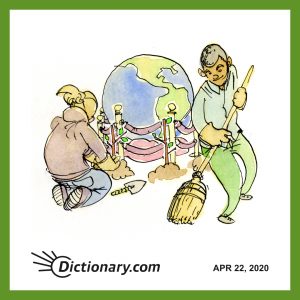Word of the Day
More about fardel
Fardel holds a place in the annals of classic literature for its use in Hamlet’s famous soliloquy: “who would fardels bear, / To grunt and sweat under a weary life …” Then again, in The Adventures of Huckleberry Finn (1884), in the “duke’s” noble, sublime rendition of Hamlet’s soliloquy: “To be, or not to be; that is the bare bodkin / That makes calamity of so long life; / For who would fardels bear, till Birnam Wood do come to Dunsinane, / But that the fear of something after death / Murders the innocent sleep….” To bear fardels means to “carry burdens.” In Middle English fardel, also fardel(l)e, fardel(l), means “a pack of goods or supplies; a collection of bundles or packs; wrapping.” The Middle English forms come from Old French fardel, a diminutive of farde “burden.” The word most likely has its origin in Arabic fardah “single piece, package, bundle.” Fardel entered English in the 14th century.
how is fardel used?
who would fardels bear, / To grunt and sweat under a weary life …
Who can endure to leave the Future all unguessed, and sit tamely down to groan under the fardel of the Present? No, no!
fardel


stewardship
noun
the responsible overseeing and protection of something considered worth caring for and preserving: New regulatory changes will result in better stewardship of lands that are crucial for open space and wildlife habitat.
More about stewardship
Stewardship is a compound of the common noun steward “a manager of someone’s property or finances” and the native English suffix –ship, which denotes condition, office, or skill. From about the beginning of the 20th century, stewardship in many Christian denominations has acquired the sense “obligation for the responsible use of time, money, and talents in the service of God and of one’s neighbor.” Stewardship entered English in the 15th century.

how is stewardship used?
As the 50th anniversary of Earth Day approaches—in a year that feels unsettlingly bleak—committing ourselves to more active Earth stewardship seems a logical, fitting and entirely necessary outcome.
Stewardship means, for most of us, find your place on the planet, dig in, and take responsibility from there—the tiresome but tangible work of school boards, county supervisors, local foresters—local politics. … Get a sense of workable territory, learn about it, and start acting point by point.
stewardship


More about taradiddle
Taradiddle (also tarradiddle), a slang term meaning “a small lie, a fib” has no clear etymology. The second element may be the verb diddle “to move back and forth or up and down quickly”; the first element tara– (or tarra-) has no explanation at all. Taradiddle (tarradiddle) entered English at the end of the 18th century.
how is taradiddle used?
“What are you?” “An engraver.” (This taradiddle I invented to account for the look of my hands.)
“A taradiddle is by definition a petty lie, a little falsehood or trifling told often to amuse or embellish a story,” he said. “As our world is full of them, seen and witnessed through advertising, P.R., propaganda, flirtations, staged events and presentations of all sorts, I simply came to the conclusion that even the straightest of photographs made in real-world witness was also such.”
taradiddle





